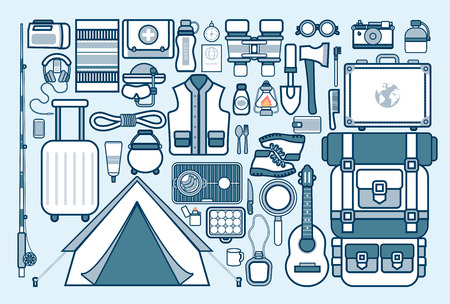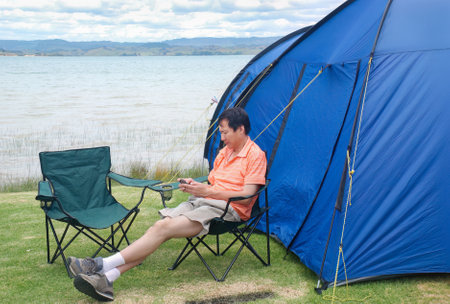1. Understanding the British Campsite Experience
When it comes to camping in the UK, there are a few things that set British campsites apart from those elsewhere. First and foremost, the famously unpredictable British weather plays a huge part in how you should prepare and pack. From sudden downpours in the Lake District to chilly evenings on the Cornish coast, being ready for all four seasons in one day is often essential. Besides the weather, many British campsites offer a wide range of facilities — some are fully equipped with hot showers, plug sockets, and even onsite cafés, while others remain more traditional and basic, embracing the wild camping ethos. Local customs also play a role; for example, wild camping is generally only permitted in certain areas like parts of Scotland, so knowing where you can pitch up legally is important. Additionally, British campsites often emphasise quiet hours and respect for nature, meaning packing for minimal impact and noise is appreciated by fellow campers. These unique aspects of camping in Britain should directly influence your packing strategy: prioritising waterproof gear, layers for warmth, adaptable cooking setups, and perhaps even a good book for those rainy afternoons under canvas.
Choosing the Right Backpack for the UK Outdoors
When preparing for a British camping adventure, selecting the ideal backpack is crucial to ensure comfort, organisation, and protection against the unpredictable UK weather. British campsites range from misty Lake District valleys to the rugged Scottish Highlands, so your pack must be up to the challenge. Here’s how to assess which features and sizes are best suited for these conditions.
Key Features to Look For
| Feature | Why It Matters in the UK |
|---|---|
| Waterproofing | Essential due to frequent rain; look for water-resistant fabrics or built-in rain covers. |
| Padded Hip Belt & Straps | Improves comfort on long walks over uneven terrain common in national parks. |
| Ventilated Back System | Keeps you cool during summer hikes and reduces sweat build-up. |
| Multiple Compartments | Makes organising wet and dry gear much easier after a soggy day outdoors. |
| External Attachment Points | Handy for stashing waterproofs, walking poles, or muddy boots outside the main compartment. |
Selecting the Right Size Backpack
The size of your backpack depends on the length of your trip and whether you’re wild camping or staying at managed sites. Here’s a quick guide:
| Trip Length | Recommended Volume (Litres) |
|---|---|
| Day Trips | 20–30L (room for essentials and weather protection) |
| Weekend Camping (1–2 nights) | 40–50L (extra space for food and layers) |
| Extended Stays (3+ nights) | 60L+ (accommodates all kit including sleeping bag and stove) |
Comfort Tips for British Terrain
Boggy moorlands, rocky paths, and rolling hills are common across Britain. Always try your backpack fully loaded before heading out—adjust straps to distribute weight evenly across your back and hips. Consider packs with adjustable back systems if you expect to share gear between family members or friends.

3. Essential Kit: Must-Haves for British Camping
If you’re aiming to pack smart for a British camping trip, there are a few absolute essentials you should never leave behind. The UK’s weather is famously unpredictable, so being prepared for anything is key. Here’s a practical breakdown of what every camper needs for an efficient and comfortable adventure.
Waterproofs: Your First Line of Defence
No matter the season, British weather can switch from sunny to soggy in minutes. Invest in a quality waterproof jacket and trousers—lightweight, breathable, and easily stashed at the top of your backpack for quick access. Don’t forget a rain cover for your rucksack too; nothing ruins a trip faster than damp kit!
Wellies or Sturdy Boots
Muddy fields are part and parcel of many UK campsites, especially after a spot of rain. Wellies (Wellington boots) are ideal for keeping your feet dry whether you’re walking to the loos or trekking local footpaths. Alternatively, go for waterproof walking boots with good grip if you plan on longer hikes.
Brew Kit: A Proper Cuppa On-the-Go
There’s nothing more comforting than a hot brew after pitching your tent in drizzle. Pack a compact stove or travel kettle, along with tea bags, instant coffee, and your favourite mug. A lightweight thermal flask also keeps your tea warm during early morning strolls.
Reliable Layering: Stay Warm Whatever the Weather
British nights can get chilly even in summer, so layering is your best friend. Start with moisture-wicking base layers, add an insulating fleece or jumper, and finish off with your waterproof shell. Pack extra socks and a woolly hat—trust us, they’ll come in handy around the campfire or during early starts.
Other Crucial Items
Don’t overlook the small stuff: headtorch (with spare batteries), quick-dry towel, biodegradable wet wipes, and a sturdy power bank for charging phones or torches. With these must-haves sorted and neatly organised in your backpack, you’ll be ready for whatever the great British outdoors throws your way.
4. Smart Packing Organisation: Layout and Accessibility
When heading off to a British campsite, strategic backpack organisation is key for both convenience and comfort. With the UK’s famously unpredictable weather and varying terrain, smart packing means you’ll always have what you need at your fingertips without upending your entire rucksack. Below are practical tips and a handy table to help keep your backpack tidy, accessible, and well-organised.
Tips for Efficient Layout
- Pack by Priority: Place items you use most frequently near the top or in easily accessible pockets—think waterproofs, snacks, or maps.
- Balance the Load: Heavier items should sit close to your back and centre of gravity to maintain balance during long treks over moorland or through woodlands.
- Utilise Compartments: Use internal dividers and dry bags to separate kit by category (e.g., sleeping gear, cooking essentials, clothing) and keep damp socks away from dry food.
Accessibility for All-Weather Readiness
- Quick-Grab Pockets: Stash a compact umbrella or lightweight waterproof jacket in an outer pocket. In the UK, a sudden downpour is never far away!
- Laminated Map Pocket: Dedicated spot for a map or route notes so you’re not rummaging in the rain.
Packing Organisation Table
| Item Type | Packing Location | British Weather Tip |
|---|---|---|
| Waterproof Jacket & Trousers | Top/Outer Pocket | Easily accessible for surprise showers |
| Socks & Base Layers | Middle Section (in dry bag) | Keep dry in case of wet ground or rain |
| Stove & Cooking Gear | Bottom Section | Packed low for weight distribution; protect from leaks |
| Torch & First Aid Kit | Side Pocket/Top Lid | Quick access for emergencies after dark or slips on muddy trails |
Clever Local Tips
- Bring a packable picnic blanket—handy for damp British grass and fits flat against the inside of your pack.
- A reusable carrier bag can double as a rain cover or somewhere to stash muddy boots before getting into your tent.
A little time spent planning the layout of your backpack pays off in spades when camping across Britain’s varied landscapes. With everything neatly organised and within reach, you’ll be ready for whatever the great British outdoors throws at you—be it glorious sunshine, coastal winds, or that inevitable light drizzle.
5. Navigating Transport and Campsite Etiquette
Travelling to British campsites often means making the most of public transport—be it trains, coaches, or local buses—followed by a bit of walking. To keep things smooth and stress-free, pack your backpack so it’s easy to handle on crowded platforms and stow away in luggage racks. A top-loading rucksack with compression straps helps minimise bulk, while a detachable daypack is ideal for keeping essentials handy when you’re on the move.
On Trains and Buses, you’ll want to avoid oversized or unwieldy bags. Opt for a compact pack that fits easily in overhead storage or under your seat. Keep valuables and tickets in an accessible pocket, but always zip everything up securely—British public transport can get busy, especially during holidays or festival season.
Walking to Your Campsite is common, so comfort matters. Distribute weight evenly, and make sure waterproofs are easy to grab if the weather turns (which, in Britain, is more likely than not). If your route involves countryside footpaths, wear sturdy shoes and pack all rubbish out with you—a nod to the British love of ‘leave no trace’ principles.
Blending In at British Campsites means being considerate and low-key. Avoid playing loud music or pitching up too close to others unless the site is busy. Greet fellow campers with a friendly “alright?” or “morning”, but respect their privacy—Brits value their personal space.
Finally, Campsite Etiquette includes keeping pitches tidy, using communal facilities respectfully, and following any posted rules about fires or barbecues. Most importantly, be prepared for changeable weather and unpredictable ground conditions; pack extra layers and a decent groundsheet to stay comfortable, whatever the British summer throws at you.
6. Real-World Packing Tips from UK Campers
When it comes to packing efficiently for British campsites, there’s no better source of wisdom than seasoned UK campers themselves. Their on-the-ground experience offers a goldmine of practical advice that can save you space, time, and hassle during your outdoor adventures.
Pack for the Weather—But Stay Flexible
British weather is famously unpredictable. Experienced campers recommend packing lightweight waterproofs and quick-drying layers rather than bulky jumpers. One camper suggests always including a compact poncho and an extra pair of dry socks, as nothing ruins morale like soggy feet after a surprise downpour.
Prioritise Accessibility
It’s tempting to bury less-used items at the bottom of your pack, but many UK campers advocate for grouping gear by activity or frequency of use. Keep your headtorch, snacks, and map in easy-to-reach pockets or the brain (top compartment) of your rucksack for swift access when needed.
Embrace Multi-Use Items
Veteran British campers swear by kit that serves more than one purpose. A sturdy microfibre towel doubles as a picnic blanket or makeshift pillow. A collapsible water bottle saves space and can be used for washing up if needed. This approach cuts down on clutter and weight in your backpack.
Smart Food Storage
To avoid attracting wildlife or creating a mess, store food in sealable bags or lightweight containers. Many recommend prepping meals in advance—think oat sachets or dehydrated curries—to save on bulk and ensure you have something warming after a chilly day outdoors.
Leave No Trace—Pack Responsibly
UK camping culture places a strong emphasis on respecting nature. Always carry rubbish bags and keep eco-friendly toiletries in an outside pocket for easy disposal at campsite facilities. As one Lake District regular puts it: “Leave every pitch as you found it—or better.”
Continuous Learning
No two trips are alike, so take notes after each outing. What did you overpack? What was missing? Seasoned campers keep a running list on their phones to refine their packing system with each adventure, ensuring they’re always ready for whatever the great British outdoors brings next.


